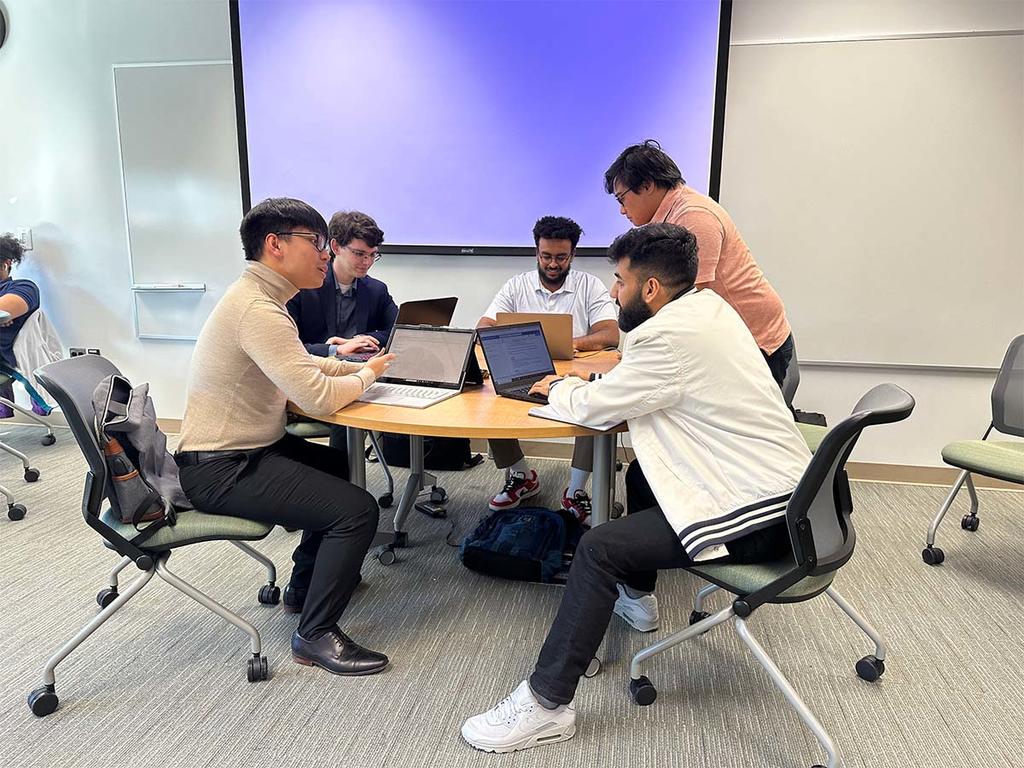Mason IST alumni may apply to be a judge or mentor

Senior students must complete a Capstone project, also known as a senior design project, before graduation. The Capstone project allows students to apply their skills and knowledge to projects done by real organizations in the fields they seek to pursue.
Capstone Criteria
Courses
The Information Technology Capstone Program is a sequence of three courses. The last two courses, IT 492 (Senior Design Project I) and IT 493 (Senior Design Project II) are taught in consecutive semesters cohort style. The Capstone courses will teach project management, business process reengineering, and Information Technology implementation. The three courses are:
- IT 343: Project Management (3 credits)
- IT 492: Senior Design Project I. (3 credits)
- IT 493: Senior Design Project II. (4 credits)
Find more details about the courses in the Mason course catalog.
Timeframe
IT492 and IT493 in the Capstone Program are two consecutive semesters. Student teams will manage the level of effort and hours needed to complete their sponsor projects. The project schedule, as part of the project plan, is created by the student teams to track deliverables and project milestones to be completed.
The measurement of successful project delivery and completion is dependent on the number of hours pooled into the tasks contributing to overall project progress. The projected number of hours per semester is noted below:
- IT 492 — 9-10 hours a week for the IT492 3-credit class
- IT 493 — 12-16 hours a week for the IT493 4-credit class
Commitment to Success
The Capstone is a significant undertaking by senior Information Technology students. They are expected to contribute many hours a week to their sponsor projects throughout the whole semester.
In the Capstone Program, students will be working with real organizations that have actual needs to improve their business processes. The high-level requirements will be provided by the sponsor for students to deliver solutions addressing these needs.
On Day 1 of the course, students are expected to come in with a list of potential sponsors. Sponsor acquisition and outreach is a component of the Capstone where students will communicate with Sponsors to properly document requirements and find the adequate solutions that best fit the organization.
Student Teams
Students will be organized into teams based on their concentrations, strengths, and skillsets. Teams can consist of about 5-7 members at best although it could vary at the instructor’s discretion. Among the members, roles and responsibilities will be assigned and each team member is expected to fulfill these responsibilities as part of their equal contribution to the team.
IT 492 Student Team Roles:
- Team Lead
- Business Analyst
- Sponsor Point of Contact
- Project Scheduler
IT 493 Student Team Roles:
- Team Lead
- Quality Assurance (QA) Analyst
- Software Developer
- Cybersecurity Technician
- Web Developer
- Business Analyst
Qualities of a good senior design project
Capstone Projects follow business requirements that meet an actual need outlined by sponsors. There will be significant time and effort allocated to analyzing existing business processes to justify the opportunity for change using information technology to solve a real-world problem.
Senior Information Technology students will demonstrate the breadth and depth of their knowledge, skills, and abilities in good projects that have the following characteristics.
- Viable real-world application
- Applicable to Information Technology concentrations at George Mason (Cybersecurity, Software Development, Database, Web Development, Networking, Data Analysis)
- Room for innovation
- Technical complexity that can be implemented based on the degree program
- Clear high-level requirements
- Can be developed and delivered in one semester
Skills
Students enrolled in the bachelor’s degree in Information Technology learn a wide range of technical skills and study the latest industry concepts. The Information Technology Capstone Program expects student teams to collaborate, plan, design, and execute tasks to achieve milestones and goals for a project.
Analyze a complex computing problem and apply principles of computing and other relevant disciplines to identify solutions. Communicate effectively in a variety of professional contexts.
An intermediate understanding of project management skills and concepts is needed to drive a project to successful completion. Practical understanding of applicable technical skills such as programming, systems analysis, database management, and cybersecurity to name but a few are instrumental skill sets that are commonplace in Capstone projects.
